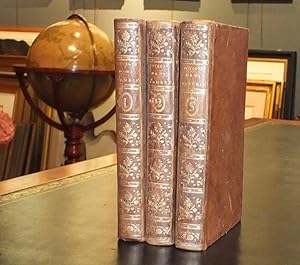Descripción
BRISSOT DE WARVILLE, Jacque Pierre (1754-1793). Nouveau Voyage dans les Etats-Unis de L'Amerique Septentrionale, Fait en 1788. Paris: Chez Buisson, 1791. 3 volumes. 8vo., (8 x 4 6/8 inches). Half-titles to volumes I and II (title-pages with authorship information censored, ie excised at and early date and paper repaired). Folding letterpress table in volume II. Contemporary mottled calf, the smooth spines decorated in 7 compartments with fine gilt tools (minor and discreet early repairs to the head and foot of the spine). Provenance: Ex-Libris Jean R. Perrette, his sale, Christie's New York, 5th April 2016, lot 418 Brissot de Warville was a leader of the Girondins, sometimes called Brissotins, a moderate bourgeois faction that opposed the radical-democratic Jacobins during the French Revolution. Brissot also harboured literary ambitions, "which led him to go to London (February November 1783), where he published literary articles and founded two periodicals, which failed. Returning to France, he was imprisoned in the Bastille for pamphlets against the queen and the government but was released in September 1784. "Inspired by the English antislavery movement, Brissot founded the Society of the Friends of Blacks in February 1788. He left for the United States in May, but, when the Estates-General were convened in France, he returned and launched a newspaper, Le Patriote français (May 1789). Elected to the first municipality of Paris, he took delivery of the keys of the Bastille when it had been stormed" (Encyclopedia Britannica online). In his Preface to "Nouveau Voyage." Brissot expresses clearly his aim of encouraging the French people to follow the American example: "The publication of 'Voyages and Travels' will doubtless appear, at first view, an operation foreign to the present circumstances of France. I should even myself regret the time I have spent in reducing this Work to order if I did not think that it might be useful and necessary in supporting our Revolution. The object of these Travels was not to study antiques or to search for unknown plants, but to study men who had just acquired their liberty. A free people can no longer be strangers to the French. We have now, likewise, acquired our liberty. It is no longer necessary to learn of the Americans the manner of acquiring it, but we must be taught by them the secret of preserving it. This secret consists in the morals of the people ? the Americans have it, and I see with grief not only that we do not yet possess it but that we are not even thoroughly persuaded of its absolute necessity in the preservation of liberty" (Preface). "After Louis XVI s flight to Varennes, Brissot attacked the king s inviolability in a long speech to the Jacobins (July 10, 1791) that contained all the essentials of his future foreign policy. Elected to the Legislative Assembly, he immediately concerned himself with foreign affairs, joining the diplomatic committee. .On April 3, 1793, Robespierre accused him of being the friend of the traitor General Charles-François Dumouriez and of being chiefly responsible for the war. Brissot replied, denouncing the Jacobins and calling for the dissolution of the municipality of Paris. He was not conspicuous in the struggle between the Girondins and the Montagnards (April May), but on June 2, 1793, his arrest was decreed with that of his Girondin friends. He fled but was captured at Moulins and taken to Paris. Sentenced by the Revolutionary tribunal on the evening of October 30, Brissot was guillotined the next day" (Encyclopedia Britannica). Howes B784; Sabin 8035. N° de ref. del artículo 72lib1459
Contactar al vendedor
Denunciar este artículo
![]()

